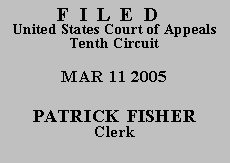 UNITED STATES COURT OF APPEALS
UNITED STATES COURT OF APPEALS
 UNITED STATES COURT OF APPEALS
UNITED STATES COURT OF APPEALS
TENTH CIRCUIT
| GREGG K. HOBBS,
Plaintiff Appellant, v. QUALMARK CORPORATION, a Colorado corporation, Defendant Appellee. |
No. 04-1246 (D.C. No. 03-WY-198-AJ (MJW)) (D. Colorado)
|
|
ORDER AND JUDGMENT(*) |
Hobbs developed the disputed seminar materials to promote two processes designed to allow manufacturers of products to conduct accelerated product testing in order to detect and correct any inherent weaknesses in their products. These processes are called: HALT (Highly Accelerated Life Testing) and HASS (Highly Accelerated Stress Screening). He conducted these seminars through his company, Hobbs Engineering Corporation ("HEC"), and later formed Qualmark Corp. in 1991 to manufacture equipment to employ the HALT/HASS methods. Qualmark acquired HEC in 1994, and in the following year, in advance of an initial public offering, Qualmark re-conveyed HEC back to Hobbs.
This case primarily requires us to determine whether the district court erred in finding that when Hobbs conveyed HEC to Qualmark he conveyed the copyrights to the HALT/HASS seminar materials, but that when Qualmark conveyed HEC back to Hobbs, it retained those copyrights. Before the district court, and on appeal, Hobbs first argues that he retained ownership of the copyrights after conveying HEC to Qualmark. In the alternative, Hobbs argues that Qualmark's re-conveyance transferred copyrights in the HALT/HASS seminar materials back to him. Hobbs filed suit in district court, asserting against Qualmark claims for: (1) copyright infringement under the Copyright Act, 17 U.S.C. §§ 101 et seq.; (2) false designation of origin and false or misleading representation in violation of § 43(a) of the Lanham Act, 15 U.S.C. § 1125(a); (3) violation of Colorado unfair competition law.
After examining each of the relevant agreements between Hobbs and Qualmark, the district court found that Hobbs and HEC unambiguously conveyed the seminar-material copyrights to Qualmark. Furthermore, after examining the September 30, 1995 agreement whereby Qualmark conveyed HEC back to Hobbs, the district court found that the agreement did not convey any copyrights because the express language of the agreement provided only for the conveyance of $1500 in office equipment from "Exhibit C" attached to the agreement as well as the "trade name, 'Hobbs Engineering,' accounts, services and contracts of HEC." With regard to Hobbs' claims under the Lanham Act and the common law, the district court found that they were preempted by the Copyright Act. Accordingly, the district court granted summary judgment to defendant Qualmark on all of Hobbs' claims. In addition, finding that Hobbs' suit was supported by "flimsy legal justifications," the district court awarded attorneys' fees and costs to Qualmark as the prevailing defendant, relying on the § 505 of the Copyright Act and Fogerty v. Fantasy, Inc., 510 U.S. 517, 533-35 (1994) (holding that a court may award attorney's fees under § 505 at its discretion).
On appeal from the district court's order, Hobbs presents three issues: (1) Did the district court err in finding no material dispute over the ownership of the seminar-material copyrights? (2) Does the Copyright Act preempt Hobbs' claims under § 43(a) of the Lanham Act and his claims under state unfair competition law? (3) Did the district court abuse its discretion in awarding attorneys' fees to Qualmark?
Because we agree with the district court's reasoning and conclusions with regard to all issues Hobbs now raises on appeal, we AFFIRM for substantially the same reasons as set forth in the district court's order of June 18, 2004. We DENY Hobbs' motion for permission to file a short rebuttal to supplement oral argument.
*. This order and judgment is not binding precedent, except under the doctrines of law of the case, res judicata, and collateral estoppel. The court generally disfavors the citation of orders and judgments; nevertheless, an order and judgment may be cited under the terms and conditions of 10th Cir. R. 36.3.